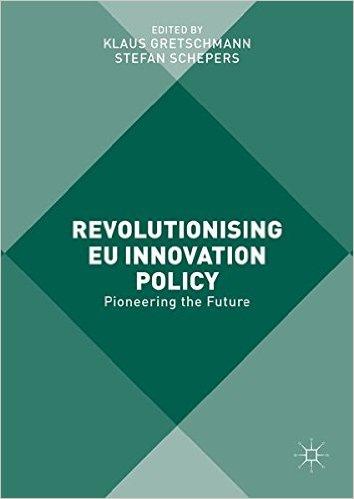| HOME | PROFILE | ACTIVITIES | CATE | NEWS | CONTACT |
PUBLICATIONS ... RECENTLY PUBLISHED

K. Gretschmann & S. Schepers, (eds.), Revolutionising EU Innovation Policy - Pioneering the Future, Palgrave/McMillan 2016, darin:
Revisiting Innovation: Revolutionising European Innovation Policy by Means of an Innovation Ecosystem, K. Gretschmann and S. Schepers, pp. 1-26
Icarus or Sisyphus: Innovation Between Hype, Rebuff and New Sobriety, pp. 53-78
Recommendations and Their Effects: Tiptoeing in Unchartered Territory, , pp. 359-412
[ download Articel ]
The European Union in stormy seas: beginning of the end or end of the beginning,
in: B. Dallago et. al. (eds), A Global Perspective on the European Economic Crisis, Routledge 2016, pp. 33-47
[ download Artikel ]Ein neues Narrativ: Sozialinnovative Marktwirtschaft,
in B. Hombach, A. Schweitzer (eds.), Mehr Argumente wagen ? wirtschaftliche Stärke und soziale Vernunft in neuer Balance, Bonn 2015, pp. 28-38
[ download Articel ]
Forging the iron or chasing the wind? - New challenges to Europe`s governance,
Forthcoming in: A. Kakabadse, S. Schepers (eds): Rethinking the Future of Europe, Palgrave/MacMillan August 2014
[ download Articel ]
"Joint Action versus Free Ride: EU Financial Crisis Management based on a Common Good"
Europe faces the upshot of a major financial and economic crisis that is far from finished. It involves a flurry of activities at various levels, including at Member State and Union level. Yet the public perception of Europe’s response has been rather mixed, with criticism focusing on the lack of decisive action and on the absence of a "unitary response" based on the "European Common Good". As the debate about the economic and political future of Europe is in full swing, there is no agreement either within the relevant decision-making bodies, such as the Competitiveness or Ecofin Councils, or in academic circles about how much economic co-ordination is required. Economic governance of the EU appears to be more an aggregation of national interests than a disaggregation of a European Common Good. However, mastering the crisis requires "reconstructing responsibility" and avoiding national free-rider attitudes; runaway speculative financial capitalism must be reshaped to become a reliable and servient means of support for business and the real economy. This implies that, we will have to strike new balances between risks and security, rewards and sanctions, consolidation and dynamics, wealth and distribution, state and markets, finance and production, equity and efficiency, trust and control, regulation and de-regulation.
[ Download Article ]
"Traum oder Alptraum – Politikgestaltung im Spannungsfeld von Nationalstaat und Europäischer Union"
The article "Traum oder Alptraum – Politikgestaltung im Spannungsfeld von Nationalstaat und Europäischer Union" (Sweet Dream or Nightmare: Policy Making between Nation-State and European Union) albeit already published in 2000, is fundamental for understanding the author’s pro-European but at the same time also critical position vis-a-vis European policy-making. It focuses on the "tug of war" between national interests on the one hand and a kind of European collective interest on the other hand which sets the scene in which national policy shifts occur. This happens through both a push effect – national politicians put the blame for unpopular national political decisions on Brussels – and a pull effect – European institutions try usurping political competences and responsibilities in order to strengthen their own power base. The article centers upon the challenges for national government departments: presenting an early warning and information about EU initiatives, interdepartmental coordination back home, creating channels of influence into Brussels as well as a skilled personnel and secondment policy. The author recommends a remodeling of national EU policy making based upon stimulating, activating and modernizing measures of unorthodox reforms.
[ Download Article ]
„Kommst Du mit der Lösung oder bist Du Teil des Problems? Politikberatung in und für Europa” (Do you come with the solution, or are you part of the problem? Policy Counseling in and for Europe)
Whenever decision makers in Brussels are in need of economic, legal or other kinds of advice, professional expert knowledge is never far away: lobbyists, law firms, scholars, thinkt tanks, committees, High Level Expert Groups, and a whole array of personal advisers, often senior ex-public officials from the European institutions or former diplomats, tout for access and influence under the heading "political consulting". The more political decisions are taken in Brussels the more political advice is sought after. This clearly holds true for problems such as BSE, energy and climate protection policies, the services or the chemicals directive and last but not least, the euro crisis. However, excellent advice requires deep procedural knowledge. It is therefore surprising to learn that many advisers show either a lack of understanding of the legal and decision processes or a merely rudimentary text-book version. Moreover, too many who offer their services don’t have any idea about the negotiation positions of the individual Member States on various dossiers in the Council of Ministers. Overall, the European consulting landscape is fragmented, not transparent and characterized by a lack of quality control. The perceptions, expectations, preferences and needs as well as the instruments, philosophies and positions vary between the advisers and their addresses and make the results of political counseling often suboptimal.
[ Download Article ]